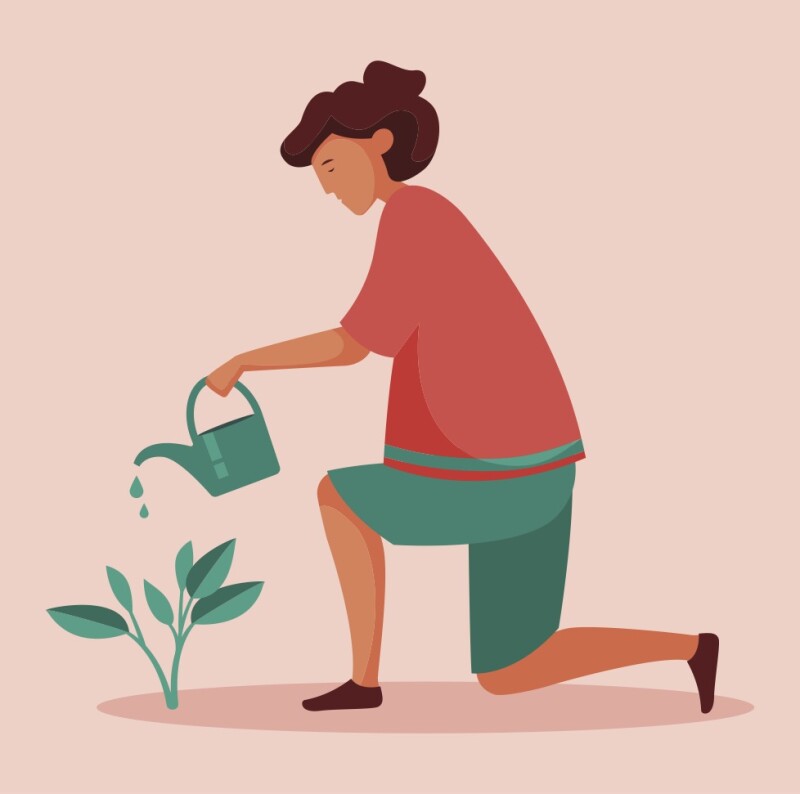One year for Christmas, my grown-up daughter gave me a mason jar full of little slips of paper. On the lid were written the words “It Mattered.” On each slip of paper in the jar she had written a little memory that stood out to her of things I had done or said that made a difference in her life.
Some of her memories were things that I remembered too. I’m glad they endured as positives in her mind. Like the slip that said, “When you smiled and hugged me after I crashed the car into a fire hydrant.” That had happened on the day of her sister’s wedding. The memory still makes me chuckle. Or the one that said, “When you helped me find a prom dress when I was stubborn and discouraged.” I remember that day too. She was convinced that every dress looked terrible on her, and shut me down every time I tried to offer positive feedback.
Other papers contained moments that I don’t recall. Like “When you used to let me wear your lip gloss to church,” or “When you cried happy tears because I finally made the volleyball team.”
As I read through those precious memories, I was struck by the simplicity of each act. I was just going about my day-to-day as her mother, making small sacrifices and tiny efforts to love and teach. I never knew which of those tiny efforts would someday make it into the “It Mattered” jar.
I just kept planting seeds, teaching and modeling the things I hoped she would learn. I tried to plant seeds of love and faith and goodness. (I know I also planted some weeds. It was kind of her to not include those in the jar).
In parenting my seven children, I have often wondered if the seeds I was planting would ever grow. I have shared what I thought was great advice, only to watch my children try things their own way. I have taught them what I believed was important, only to see no immediate evidence that they agree.
Sometimes I have found myself feeling impatient. I want my children to listen to me and apply my counsel immediately. For example, I have tried to teach my daughters about their divine nature and the beauty of virtue. But the messages coming at them from the world are loud, and they have at times struggled to recognize their own value. I have taught the principle and planted the seed, but then I have to be patient and give it time to germinate. I have taught my sons that hard work will bless their lives, but they didn’t necessarily believe me right away. Those seeds laid dormant for a while until their soil was ready, and they watered it with their own life experiences.
I have planted seeds of faith by consistently teaching my children the joy of the gospel. I have watered those seeds with family scripture study and prayer. And yet, some of those seeds are still waiting for the right conditions to be able to flourish. The waiting period can be painful for me. I hope that I have done enough. I pray for divine intervention to make up for any lack on my part. Then I plead for the faith and strength I need to endure the waiting.
Parenting is, at its core, a work of planting seeds. We plant seeds of kindness to siblings and patiently tend that garden, but it may take years before we see our children learn to get along. We plant seeds of order and cleanliness, knowing they may not value those things until they are all grown. We sometimes plant seeds of faith and are then required to watch and pray for many years before we see any fruit.
It’s a process that can’t be rushed. The Bible teaches us that “to every thing there is a season, and a time to every purpose under the heaven. … A time to plant, and a time to pluck up that which is planted” (Ecclesiastes 3:1–2).
For any seed to grow, it requires the right conditions and plenty of time. Different seeds require different growing conditions. They grow at different rates and mature at different times of the year. A gardener who doesn’t understand, or tries to rush the laws of nature, will end up frustrated. And if the gardener is too eager and impatient, he or she may even end up damaging the seed—too much watering, for example, can reduce the amount of oxygen in the soil and drown a delicate seedling. Excessive fertilizing can burn a plant’s tender roots. Even cultivation of the soil can be overdone: too much digging can disrupt nature’s process of enriching the soil with good bacteria and organisms that support healthy plant growth.
Those same laws of nature apply to human development. No matter how often or how clearly we teach, true learning cannot take place without personal experience. In his book Unconditional Parenting, Alphie Kohn says, “The way kids learn to make good decisions is by making decisions, not by following directions.” Said another way, we cannot become who God wants us to become without allowing for agency and personal experience.
Elder Dale G. Renlund has taught similar principles: “Our Heavenly Father’s goal in parenting is not to have His children do what is right; it is to have His children choose to do what is right and ultimately become like Him. If He simply wanted us to be obedient, He would use immediate rewards and punishments to influence our behaviors.” Our Heavenly Father never forces or tries to rush our growth or compliance. It is important to Him that we choose obedience for ourselves.
It is our privilege and responsibility as parents to plant and to tend the seeds of faith and goodness. But the seeds will never truly mature without agency. If we become impatient, if we try to force growth or maturity before its time, we may end up hindering the beautiful, natural process of growth.
Luckily, there is a master gardener who oversees every garden. Our Father in Heaven knows the times and seasons much better than we do. He understands what each seed needs to thrive, and He is ultimately in charge of creating the right conditions. He has given us the job of planting seeds and helping Him in His work. But our understanding is limited, and our perspective is lacking.
Part of our work is learning to trust His timing—to trust that He is mindful of each of His children and that He knows exactly when and how those seeds will grow best. When we have faith in His plan, it’s easier to be content with the part assigned to us. We can plant seeds and tend the garden without panicking about how long the growth is taking. We can love and teach without worry or urgency, free to enjoy the unique process of growth in each of our children.
Elder Jeffrey R. Holland has said, “If you try your best to be the best parent you can be, you will have done all that a human being can do and all that God expects you to do.”
We are not expected to have all the answers. We are not expected to get it right all of the time. And excessive worrying or hand-wringing are not the tools that help things grow. When we have planted and cultivated good seeds, in the best way we knew how at the time, we have done our part. We can be at peace, even if we have not yet seen those plants bear fruit.
We never know which of those tiny teaching moments will make it into the “It Mattered” jar. We can’t possibly know the outcome of the little seeds we plant. We just know that our job is to plant good seeds—as many of them as possible. And we lovingly tend and nourish them, without being in a rush. Then we trust in the Lord to do the rest, knowing that He watches over each seed with wisdom and love. When we are filled with faith, we are free to marvel at the beauty of His process.


